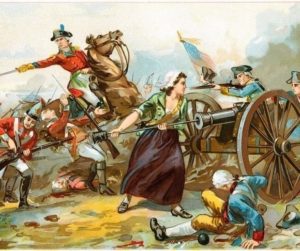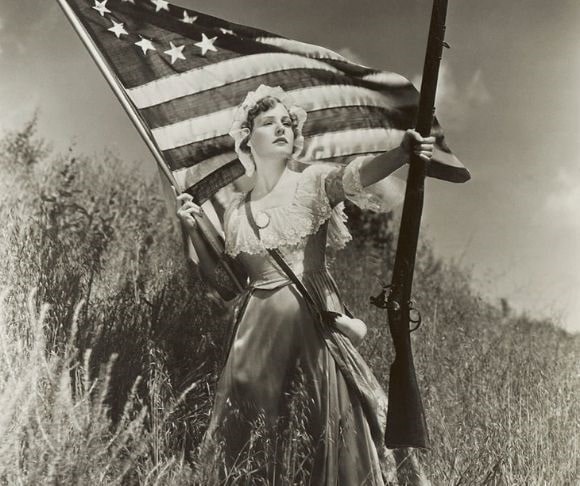The Founding Fathers and their heroic actions helped form the country most admired and often envied by the rest of the world, where freedoms are first and foremost protected. But the men did not establish this nation without the help of women, no matter what the old history books portray. Women were warriors, nurses, couriers, and seamstresses. Many were camp followers: traveling with husbands from one battlefield to the next, doing laundry and cooking for the company.
On The Battlefield
Deborah Sampson disguised herself as a man and joined the Continental Army in battle. She was the only female to earn a full military pension for her service in the Revolutionary War. Calling herself Robert Shurtleff after her deceased brother, Sampson joined the Fourth Massachusetts Regiment. Subsequently, she was assigned to Captain George Webb’s Company of Light Infantry at West Point, NY. Sampson was given the dangerous assignment of scouting for British troop formations. Sampson and two sergeants led troops on a scouting mission that ended in a confrontation with the British Army in 1782, where she raided a Tory home resulting in the taking of several prisoners.

Molly Pitcher
(Photo by: Universal History Archive/Universal Images Group via Getty Images)
Mary Ludwig Hays, also referred to as Molly Pitcher, took her injured husband’s place during the Battle of Monmouth in 1778. The term “Molly Pitcher” basically applied to camp followers who brought water to the men on the battlefields. Some soldiers described Mary as a “twenty-two-year-old illiterate pregnant woman who smoked and chewed tobacco and swore as well as any of the male soldiers.” Margaret Corbin also followed her husband’s unit and found herself on the artillery line during the British assault on Fort Washington in 1776. Corbin received a soldier’s lifetime pension after the war.
History books are short on information about the six-foot-tall redheaded patriot and warrior Nancy Hart. An herbalist, markswoman, and hunter, Hart protected her Georgia backwoods community. Frequently, she disguised herself as a crazy old man wandering through the woods. In this way, she gathered intel to pass along to local militiamen. During one incident, the frontier woman was making soap when a British spy came upon her farm. She doused him with boiling water, tied him up, and turned him over to the Continental Army. Her Cherokee neighbors nicknamed her Wahatche – meaning “war woman.”
Communication Is Key
Most Americans have heard of the Midnight Ride By Paul Revere, a poem written by Henry Wadsworth Longfellow about Revere’s heroic ride through the night, alerting colonists how the British were going to attack. But did anyone write a poem for Sybil Ludington, the New York teenager that rode a forty-mile route – twice the distance of Revere — in the pouring rain April 26, 1777? At just 16-years-old, Ludington rode across Putnam and Dutchess Counties, rousing local militia to prepare for battle following an attack in nearby Danbury, Connecticut.
Mercy Otis Warren also made a name for herself as a patriot and vocal denouncer of British policy. As a published author of satire and political dramas, Warren’s messages disguised as entertainment, were read in Massachusetts Spy and were bitterly critical of Massachusetts’s key officials, specifically Governor Thomas Hutchinson. Warren also enjoyed protesting inequality, boycotted products from Mother England, and lauded the Boston Tea Party, encouraging others, through print, to do the same.
 A spy, a scout, and a messenger describe best the war efforts of Catherine “Kate” Moore Barry. Kate is also the underlying reason General Charles Cornwallis was defeated and surrendered in Yorktown, VA. Kate knew every Indian trail through the woods, outpacing and outfoxing the British. She roused and rallied the militia who turned the tide at the Battle of Cowpens. Cornwallis left South Carolina soon after and surrendered to General George Washington.
A spy, a scout, and a messenger describe best the war efforts of Catherine “Kate” Moore Barry. Kate is also the underlying reason General Charles Cornwallis was defeated and surrendered in Yorktown, VA. Kate knew every Indian trail through the woods, outpacing and outfoxing the British. She roused and rallied the militia who turned the tide at the Battle of Cowpens. Cornwallis left South Carolina soon after and surrendered to General George Washington.
And the landed gentry played a role as well: Abigail Adams, married to a Founding Father, John Adams, has been slightly pushed aside in favor of her husband. But the future president acknowledged that Abigail was indeed his closest personal and political adviser during the Revolutionary War and beyond to the U.S. presidency. Famously repeated by John Adams, Abigail wrote letters to John while he helped create a new government in Philadelphia at Constitution Hall: she frequently reminded him to “remember the ladies” or perhaps there would be a different kind of revolution in the future.
Mrs. Adams believed in the cause but also wrote four months before the first shot rang out at Lexington and Concord: “America stands armed with resolution and virtue, but she still recoils at the idea of drawing the sword against the nation from whence she derived her origin.”
~
Read more from Sarah Cowgill.




